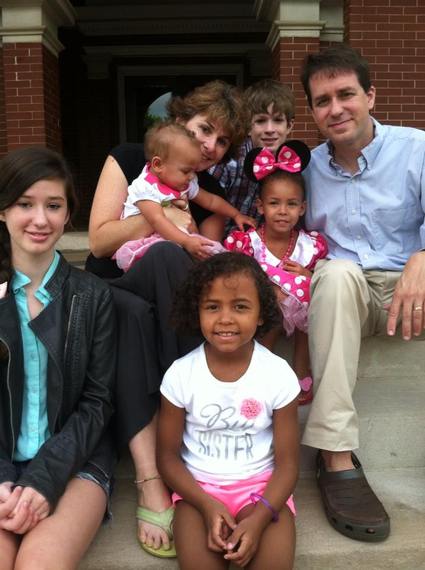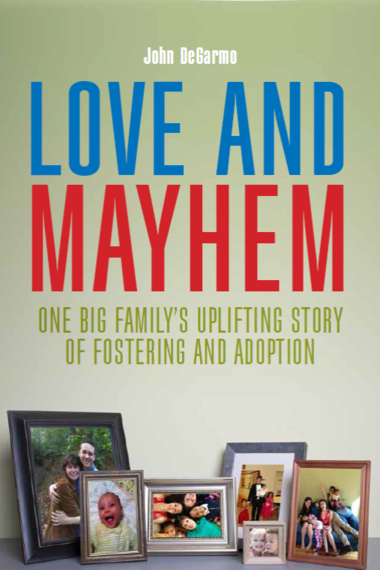They say "men don't cry."
They say that men are too tough to cry, and that crying is a show of weakness.
To those men, I say you are sadly, very wrong.
It had been two months since Maddie, our last foster child, had left our home. The 4-year-old girl had been with us for just under one year, and had made a significant impact not only on both my wife and I, but on our own children, as well. She had very much become a part of our family, and there were talks about the possibility of adopting her. Sadly, as it is many times for foster parents, the 4-year-old was moved to another home, where she would be closer to her biological family members. It was an emotionally difficult time for us. Her last words to me stung deep; "Daddy, will you miss me when I am gone? Will you still love me when I leave?"
Those words clung to me, as I struggled to deal with the emotions that swirled within me. What I did not know, though, was that my own children were dealing with similar emotions.
"Daddy, I miss Maddie," my own 6-year-old daughter old me while we sat down for lunch. "I wish I could play with her right now."
"I wonder if Maddie misses me as much as I miss her," my 16-year-old daughter said to no one in particular one Sunday morning, as we drove to church.
Both girls were expressing the feelings of grief and loss that were swirling around inside of them for the child that had come into their home and had become both a playmate and a sister to them. My 9-year-old daughter was having a more challenging time, though. As one who has a difficult time expressing her emotions, she instead kept her feelings to herself. In truth, she probably missed the four year old the most in our home. Our 9-year-old had taken upon herself to make sure that her 4-year-old foster sister was happy, was healing, and was learning. Perhaps it was the fact that this 9-year-old of ours was adopted from foster care, herself. Whatever the reason, each of my children was struggling with the grief each felt.
And so was I.
The knot in my stomach, the heavy pressure in my shoulders, the ache in my heart; they were all real. So were the tears that slid down my face.
My own children need to understand that it is okay to grieve. To be sure, I support them as they experience times of grief and loss. Along with that, I allow them to cry, and reassure them that it is okay and normal to do so. To be sure, crying can be healing, as it can allow us to release feelings and emotions, instead of burying them deep down inside of ourselves.
It was important for my children to see me grieve. For those dads who say they don't allow their children to see them cry, here's where you are wrong. My own children need to see me cry. It is important for children to see how their parents handle their own grief, and how to express it. Now, my own children will not see me cry in a hysterical or uncontrollable manner. However, they do need to understand that crying is acceptable and natural during difficult time and situations. It is okay for my children to see that I am hurting inside. Yet, sadly there are many dads out there who will deny this. In its place, they bottle their emotions and feelings with alcohol, drugs, other vices, or even with work.
That's what I did with the death of my first child. I refused to cry. I was too tough to do so. Instead, I busied myself in my work, spending longer hours each day at my work place, instead of with my family. I tried to tell myself that I was strong. To be sure, this was the weakest time in my life, and did damage to myself, my family and my marriage. I did not allow myself to grieve properly. I did not allow myself to cry.
Each of my children grieves in their own way, and each of my children look to me to find out how to process their own feelings in their own way. With this in mind, I try to show my children that it is okay to have these feelings, and that they are normal. Not only do I talk with my children about the sadness they might be feeling, I also allow them to see my own sadness.
I allow them to see Daddy cry.
For more, read Dr. John's memoir Love and Mayhem: One Big Family's Uplifting Story of Fostering and Adoption.
Dr. John DeGarmo has been a foster parent for 14 years, now, and he and his wife have had over 50 children come through their home. He is a consultant to legal firms and foster care agencies, as well as a speaker and trainer on many topics about the foster care system. He is the author of several foster care books, including the inspirational best seller Fostering Love: One Foster Parent's Journey, and writes for several publications, including Foster Focus magazine. He can be contacted at drjohndegarmo@gmail, through his Facebook page, Dr. John DeGarmo, or at his website.

